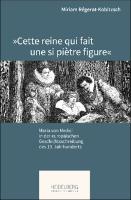» Cette reine qui fait une si piètre figure «
Single-Blind-Peer-Review overseen by Series Editor
Maria von Medici in der europäischen Geschichtsschreibung des 19. Jahrhunderts
Author(s)
Régerat-Kobitzsch, Miriam
Collection
AG UniversitätsverlageLanguage
GermanAbstract
Successive generations have remembered Marie de’ Medici (1575–1642), Queen of France, as an incompetent regent, obsessed with power and alleged to have murdered her husband. Moreover, historians often saw no more to her cultural work and politics than a female and Italian parenthesis between the reign of Henry IV and the ministry of Richelieu. This unfavourable image of the second Medici-regent survived the French Revolution and was solidified in the master narrative of an increasingly bourgeois, republican and secular French nation. The present volume provides the first-ever investigation into Marie de’ Medici’s colourful reception during the 19th century. It offers an in-depth analysis of historical writing, society and politics in the pan-European period of crisis and change called the Age of Nationalism Marie de Médicis (1575-1642), reine de France, est restée dans les mémoires comme une souveraine incapable, obsédée par le pouvoir et soupçonnée d’avoir assassiné son mari. Ses actions culturelles et politiques ont souvent été réduites à une parenthèse féminine et italienne entre le règne d’Henri IV et le ministériat de Richelieu. Cette image a survécu à la Révolution et s’est consolidée dans le discours historique identitaire d’une nation française de plus en plus bourgeoise, républicaine et laïque.Pour la première fois, la réception mouvementée de Marie de Médicis au XIXe siècle fait ici l’objet d'une enquête approfondie. L’étude offre un vaste aperçu de l'imbrication de l’historiographie, de la société et de la politique pendant les crises et les bouleversements des nationalismes européens. Die französische Königin Maria von Medici (1575–1642) blieb der Nachwelt als unfähig, machtbesessen und mutmaßliche Gattenmörderin in Erinnerung. Ihr kulturelles und politisches Wirken wurde in der Geschichtsschreibung häufig zu einer weiblichen und italienischen Klammer zwischen der Herrschaft Heinrichs IV. und dem Ministeriat Richelieus reduziert. Dieses Bild überdauerte die Revolution von 1789 und verfestigte sich im identitätsstiftenden historischen Diskurs einer sich zunehmend bürgerlich, republikanisch und laizistisch definierenden französischen Nation. Die bewegte Rezeption der zweiten Medici-Regentin im 19. Jahrhundert ist hier erstmals Gegenstand einer Untersuchung. Sie bietet tiefe Einblicke in die Verquickung von Historiographie, Gesellschaft und Politik in der europaweiten Krisen- und Umbruchszeit des Nationalismus.
Keywords
France; Metanarrative; Marie de’ Medici; Historiography; 19th Century; Frankreich; Metanarrativ; Maria von Medici; Historiographie; 19. JahrhundertDOI
10.17885/heiup.540Publisher
Heidelberg University Publishing (heiUP)Publisher website
https://heiup.uni-heidelberg.de/Publication date and place
Heidelberg, 2020Series
Pariser Historische Studien, 115Classification
Historiography


 Download
Download Web Shop
Web Shop